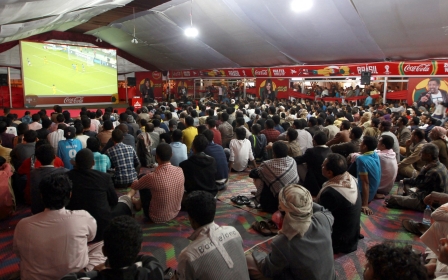US senator pulls vote for Yemen war powers bill after White House opposition

US Senator Bernie Sanders has scrapped plans to put his resolution to end US support for the war in Yemen to a vote, saying on Tuesday evening that he would work with the White House on a compromise after the Biden administration signalled opposition to the resolution.
However, the senator said that if the sides are not able to come up with a strong measure, he would again place his resolution to a vote.
"I'm not going to ask for a vote tonight," Sanders said on the Senate floor. "I look forward to working with the administration who is opposed to this resolution and see if we can come up with something that is strong and effective. If we do not, I will be back."
Sanders' resolution would have put a definitive end to US support for the Saudi-led coalition in Yemen by ending "sharing intelligence for the purpose of enabling offensive coalition strikes" and also ending "logistical support for offensive coalition strikes", including providing maintenance and spare parts for Saudi fighter jets.
The measure was meant to send a clear signal to the Biden administration about where Congress stands on its views of the US-Saudi relationship.
"We must fundamentally reassess our relationship with the murderous regime of Saudi Arabia. We can and we must begin to do that by ending our support for the Saudi-led war in Yemen," Sanders said.
But early on Tuesday, the White House had begun to privately circulate talking points including that President Joe Biden's aides would recommend a veto if the bill passed and that the administration was "strongly opposed" to it, according to a report by The Intercept.
Middle East Eye reached out to the White House for comment on Tuesday but did not receive a response.
White House press secretary Karine Jean-Pierre acknowledged the administration's approach when pressed during a news conference.
"We're in touch with members of Congress on this. Thanks to our diplomacy which remains ongoing and delicate, the violence over nine months has effectively stopped," she said.
"The situation is still fragile and our diplomatic efforts are ongoing and we want to make sure this is not affected and the people of Yemen do not suffer."
US should have ended support years ago
A similar Yemen War Powers Resolution was passed in 2019 by both the House and Senate. However, the administration of former President Donald Trump vetoed the bill.
The Biden administration's opposition to the measure marks a policy reversal as, under the Trump administration, many individuals who are now key members of the Biden administration had signed a letter supporting an end to US support for the Yemen war.
Jamal Benomar, a former UN special envoy for Yemen, also criticised the White House's rationale that the war powers resolution would harm US diplomacy. In an interview with The Intercept, he said: "There's been no diplomatic progress whatsoever."
Anti-Yemen war advocates have said that now is the ideal time to put forth the resolution as the ceasefire in Yemen has expired more than two months ago and fighting could resume without any constraints.
"The administration has expressed concern that this is kind of a sensitive moment. We have the truce that expired, transborder attacks have not resumed. We have seen the Houthis carrying out drone attacks on oil facilities," said Annelle Sheline, a research fellow at the Quincy Institute's Middle East programme.
Sheline said that the Biden administration's view is: "We don't want to derail diplomacy."
"But from my perspective, the US should have ended its involvement in this war years ago. And it's better late than never."
Hassan el-Tayyab, legislative director for Middle East policy at the Friends Committee on National Legislation, told MEE that the resolution would "help keep Saudi Arabia at the negotiating table to end the war".
Following the news of the vote being scuppered, Tayyab said on Twitter that he was surprised Sanders pulled the vote, but supported working with the White House on a negotiated bill.
"Our 100+ org coalition's goal is to end US complicity in the war. We will work with anyone who wants to help us get that done. Sen Sanders should reintroduce the bill in the 118th [Congress] & start the negotiation from there. If they can't agree, Sanders must force a vote on the WPR," he said.
The cancellation of the vote on Tuesday comes two months after a ceasefire between the Iran-aligned Houthi rebels and the Saudi-led coalition expired. The country has not erupted into fighting again. Anti-Yemen war advocates were hoping the bill's passage would end any possibility of a renewed conflict.
'Return control of the conflict to Yemenis'
Yemen descended into civil war in 2014, when Houthi rebels seized the capital, Sanaa, forcing the internationally recognised government to flee to Saudi Arabia. Riyadh and a coalition of regional allies, chiefly the UAE, intervened in March 2015 to push the Houthis back.
The Saudi-led coalition launched a wide-ranging aerial bombing campaign, carrying out thousands of air strikes in an effort to roll back the rebels.
'It's crucial that the possibility of US-assisted foreign air strikes end'
- Annelle Sheline, Quincy Institute for Responsible Statecraft
The coalition also imposed an economic blockade on Houthi-controlled areas, including a sea and air blockade, worsening economic conditions for millions of Yemenis.
More than 11,000 children have been killed or maimed as a result of the war, according to Unicef.
After entering office last year, Biden announced an end to support for offensive operations in the Saudi-led coalition's war efforts in Yemen. However, experts and lawmakers raised concerns following the decision, questioning what the distinction of offensive entails in the conflict.
The main concern for lawmakers that have pushed for an end to US support for the war is the end of American support for coalition air strikes.
"It's crucial that the possibility of US-assisted foreign air strikes end so that control of the conflict can be returned to Yemenis," Sheline said.
"This is what we know about civil wars - when they're internationalised, they tend to last longer. And so by ending US support, and by reducing the Saudi's ability to be able to conduct air strikes, this is helping to return control of the conflict to Yemenis."
Shireen al-Adeimi, a Yemeni American academic and assistant professor at Michigan University, said the vote was the perfect opportunity for Congress, which "has a duty" to "re-assert its constitutional powers to codify an end to US military support for the Saudi and UAE coalition".
"The war on Yemen has been carried out illegally under three US presidents despite the incredible humanitarian crisis this war unleashed on the people of Yemen," Adeimi, who is also a non-resident fellow at the Quincy Institute, told MEE.
Middle East Eye delivers independent and unrivalled coverage and analysis of the Middle East, North Africa and beyond. To learn more about republishing this content and the associated fees, please fill out this form. More about MEE can be found here.






